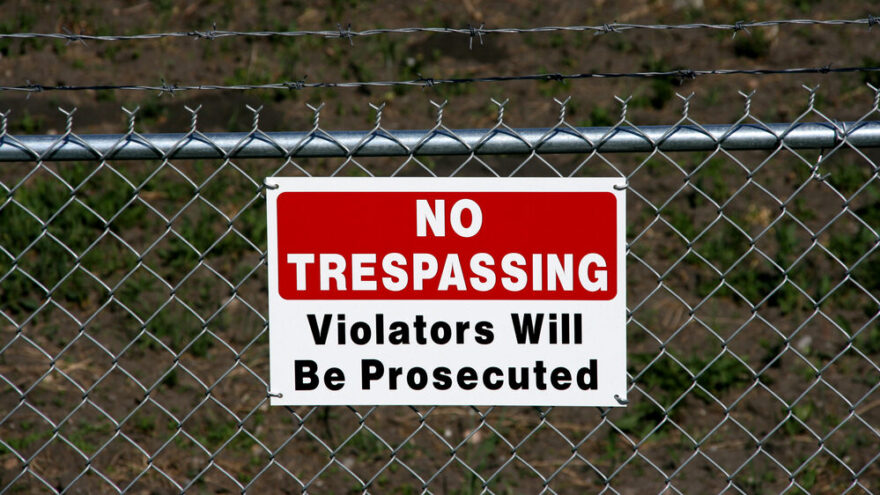Criminal trespassing is a serious offense that can lead to severe consequences in New Jersey. Trespassing occurs when a person knowingly enters or remains on someone else’s property without authorization. Whether it’s a private residence, business premises, or government facility, trespassing can result in legal ramifications that should not be taken lightly. This article will delve into the penalties for criminal trespassing in New Jersey, helping you understand the gravity of the offense and the importance of seeking professional legal counsel when faced with such charges.
I. What is Criminal Trespassing?
In New Jersey, criminal trespassing is defined under N.J.S.A. 2C:18-3. It includes various elements, such as entering or remaining unlawfully on another person’s property, defying a “No Trespassing” sign, or disregarding a verbal warning from the property owner or their representative. The intent of the trespasser, such as whether they meant to commit a crime while on the premises, can also impact the severity of the charges and potential penalties.
II. Degrees of Criminal Trespassing:
New Jersey law distinguishes between different degrees of criminal trespassing, each with its respective penalties:
- Fourth-Degree Trespassing: This involves trespassing on property that is generally open to the public, such as retail stores, restaurants, and entertainment venues. Committing fourth-degree trespassing carries penalties of up to six months in jail and fines up to $1,000.
- Third-Degree Trespassing: This type of trespassing involves entering or remaining on private property or government facilities, such as schools or government buildings. Third-degree trespassing is more severe and can result in a maximum of 18 months in prison and fines reaching $10,000.
- Petty Disorderly Persons Offense: This includes trespassing on structures or other properties, like businesses or government facilities. The penalty for this offense may lead to a jail term of up to 30 days and fines not exceeding $500.
III. Factors Influencing Trespassing Penalties:
Several factors may influence the severity of penalties for criminal trespassing in New Jersey. These factors include:
1. Prior Criminal Record: Individuals with a history of similar offenses may face harsher penalties than first-time offenders.
2. Damage to Property: If the trespasser causes damage to the property or engages in other criminal activities while trespassing, the penalties may increase.
3. Intent: The prosecution may consider the intent behind the trespassing. For instance, if the intent was malicious or to commit another crime, the penalties might be more severe.
4. Possession of Weapons: If the trespasser carries a weapon during the act, even if they do not intend to use it, the charges may be elevated to a more serious offense.
IV. Defenses against Criminal Trespassing Charges:
If you are facing criminal trespassing charges in New Jersey, it is crucial to understand your rights and any possible defenses that may be available. Some common defenses include:
- Lack of Intent: Proving that you had no intention to trespass, such as by being unaware of the property boundaries or believing you had permission to enter.
- Lack of Notice: If the property lacked visible signs warning against trespassing, the accused may argue that they were not aware of the restriction.
- Consent: If the property owner gave you permission to be on the premises, either explicitly or implicitly, you may not be considered a trespasser.
- Mistake: Demonstrating that you genuinely believed you had the right to enter the property can serve as a criminal defense against trespassing charges.
- Unlawful Arrest: If the authorities arrest the individual without proper justification, it may lead to dismissal of the charges.
V. Protecting Your Rights:
When facing criminal trespassing charges, it is essential to have a skilled and experienced criminal defense attorney by your side. A knowledgeable attorney can examine the details of your case, build a strong defense, and protect your rights throughout the criminal process. They can also negotiate with the prosecution to potentially reduce charges or penalties.
Contact The Law Offices of Michele Finizio Today for a Confidential Consultation About Your Criminal Defense
Facing criminal trespassing charges in New Jersey can be daunting, but you don’t have to go through it alone. The Law Offices of Michele Finizio are here to provide you with the expert legal counsel you need to protect your rights and navigate the complexities of the legal system.
Our team of skilled and experienced attorneys understands the gravity of criminal trespassing charges and the potential consequences that come with them. Don’t let criminal trespassing charges tarnish your future and reputation. Seek the assistance of The Law Offices of Michele Finizio to ensure that your side of the story is heard, your rights are safeguarded, and your freedom is protected.
Contact us today to schedule a consultation and take the first step towards securing your future. Remember, when it comes to criminal trespassing charges, the right defense can make all the difference.

